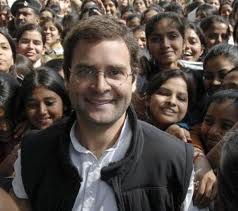 New Delhi, July 28: It may be a while before Rahul Gandhi moves in as the general, but his troops are already been moved to take charge.
New Delhi, July 28: It may be a while before Rahul Gandhi moves in as the general, but his troops are already been moved to take charge.
Four Youth Congress members, all known to be Rahul's wards, have been elevated to the party's state units, and are in line for important posts. The graduation from youth members to leadership positions in the big league coincides with Rahul's impending move as the de facto Congress numero uno.
Sources said Baptu Chakraborty, Amarendra Singh Raja, Paresh Dhanani and Jothimani - general secretaries in the Youth Congress - are set to branch out to mainstream state units. Chakraborty, Raja and Dhanani will be general secretaries in Tripura, Punjab and Gujarat, respectively. Jothimani will be the new president of Mahila Congress in Tamil Nadu.
Rahul's baba brigade set to replace old guard?
This is the first instance of Rahul Gandhi's charges taking responsibility in the main Congress and comes at a time when the demand for him to take the party reins is gathering momentum. On Friday, Kerala party chief Ramesh Chennithala demanded the heir-apparent be designated V-P of the party.
Congress circles see the elevation of the young leaders as a precursor to what might unspool later, with Rahul's proteges taking charge of crucial stations in the party, perhaps at the old guard's expense.
To observers, this is seen as absorption of apprentices from the "training school". The process could become institutionalized in future once Rahul calls the shots in the AICC.
Rahul has a legion of such workers, whom he groomed after taking charge of the youth outfit as AICC general secretary. They caught his eye as he tried to reinvent the jaded frontal bodies.
The shift to the mother outfit marks the mainstreaming of Youth Congress which remained walled off under Rahul, because of the belief that attempts to reinvent the outfits could be hampered by the influence of the older guard resistant to change. "It means empowerment of youth. It also shows that youth politics is not an end in itself but part of the larger Congress programme," a senior leader said.
Youth Congress's attempt to acquire an independent profile had made the party elite jittery. The election of its office-bearers gave a halo to the winners, and it raised fear among senior leaders that the youngsters could replace them soon.





Comments
Add new comment